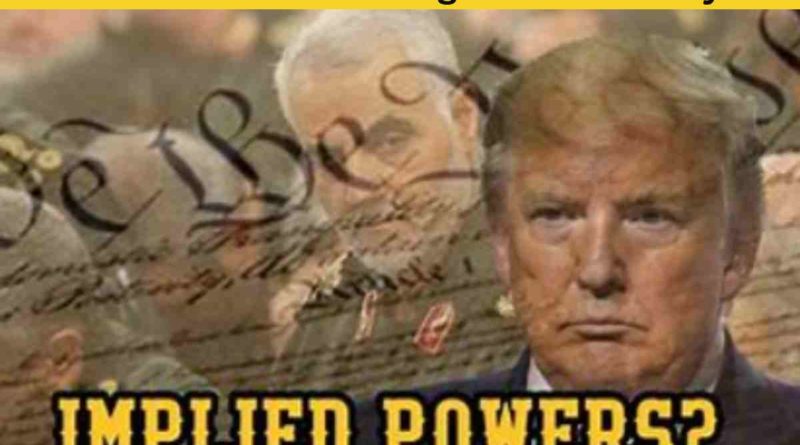Which of the Following Is Most Closely Related to the Concept of Implied Powers?
Which of the Following Is Most Closely Related to the Concept of Implied Powers?: In the realm of constitutional law and governance, the concept of “implied powers” holds significant importance, particularly within the context of interpreting and applying a nation’s constitution. Implied powers refer to those powers and authorities that are not explicitly stated in the constitution but are considered necessary to carry out the government’s expressed or enumerated powers effectively. The concept of implied powers is often a subject of debate and interpretation, as it involves discerning the scope and limitations of government authority. In this comprehensive article, we will explore the concept of implied powers, its historical context, and its relationship to various aspects of constitutional governance.
Understanding Implied Powers
To grasp the essence of implied powers, we must first comprehend the broader framework of constitutional governance.
Constitutional Foundations 📜
A constitution serves as the supreme law of a nation, outlining the structure of government, establishing the rights of citizens, and defining the powers and responsibilities of various branches of government.
Enumerated and Implied Powers 📝
Within a constitution, powers granted to the government can be classified into two categories: enumerated powers (explicitly stated) and implied powers (derived from the necessary and proper clause).
The Necessary and Proper Clause
The Necessary and Proper Clause, also known as the Elastic Clause, is a pivotal provision found in various constitutions, including the United States Constitution.
United States Constitution 🇺🇸
In the U.S. Constitution, the Necessary and Proper Clause is found in Article I, Section 8, Clause 18, and reads as follows: “To make all Laws which shall be necessary and proper for carrying into Execution the foregoing Powers, and all other Powers vested by this Constitution in the Government of the United States, or in any Department or Officer thereof.”
Interpreting Implied Powers 🔍
The Necessary and Proper Clause grants Congress the authority to enact laws that are “necessary and proper” for executing the enumerated powers and carrying out the functions of the federal government effectively.
Historical Origins of Implied Powers
The concept of implied powers can be traced back to the early history of constitutional interpretation.
McCulloch v. Maryland (1819) 🏛️
One landmark case that shaped the understanding of implied powers is McCulloch v. Maryland. In this case, the U.S. Supreme Court upheld the constitutionality of the Second Bank of the United States and established the principle of implied powers based on the Necessary and Proper Clause.
Expanding Federal Authority 📈
The ruling in McCulloch v. Maryland bolstered the scope of federal authority by acknowledging that Congress possessed implied powers necessary for executing its enumerated powers, even if not explicitly mentioned in the Constitution.
Implied Powers and Federalism
Implied powers can also have implications for the division of powers between the federal government and state governments in a federal system.
Dual Federalism vs. Cooperative Federalism 🏛️
Throughout U.S. history, the understanding of implied powers has influenced the balance between dual federalism (where powers are strictly divided between federal and state governments) and cooperative federalism (where federal and state governments collaborate in various policy areas).
Federal Preemption 📜
Implied powers can be invoked in cases of federal preemption, where federal laws take precedence over conflicting state laws when Congress acts within its constitutional authority.
Executive Implied Powers
While the Necessary and Proper Clause is most prominently associated with the implied powers of the legislative branch, the concept also extends to the executive branch.
Executive Discretion 🖊️
The President, as the head of the executive branch, has implied powers to exercise executive discretion in implementing laws and executing the duties of the office.
Executive Orders 📜
Executive orders, while not explicitly mentioned in the U.S. Constitution, are derived from the President’s implied powers and serve as directives to the executive branch on how to implement and enforce laws.
Also, Read A Magma’s Viscosity: Direct Relationship to Composition and Temperature
Implied Powers and Judicial Review
The principle of implied powers can intersect with the concept of judicial review, which empowers courts to interpret the constitutionality of laws and government actions.
Judicial Review’s Origin 🏛️
The seminal case of Marbury v. Madison (1803) established the authority of the U.S. Supreme Court to engage in judicial review.
Measuring Constitutionality 🔍
In cases involving implied powers, courts may assess whether the exercise of such powers is consistent with the spirit and purpose of the constitution and whether they are necessary and proper to achieve a legitimate governmental objective.
Modern Applications of Implied Powers
In contemporary contexts, the concept of implied powers continues to shape debates and legal interpretations.
Controversial Issues 🤔
Controversial topics, such as the scope of the federal government’s authority in areas like healthcare, environmental regulation, and commerce, often involve arguments based on implied powers.
Follow Us On NewUsaNews Facebook Page
Evolution of Jurisprudence 📜
As societies evolve and governmental functions become more complex, the interpretation of implied powers may evolve as well, reflecting changing societal norms and challenges.
Conclusion
In conclusion, implied powers are a critical aspect of constitutional governance, especially within the context of interpreting and applying a nation’s constitution. Derived from the Necessary and Proper Clause, implied powers empower governments to execute their enumerated powers effectively. The concept has historical origins, as seen in the landmark case of McCulloch v. Maryland, and it has far-reaching implications for the division of powers in federal systems and the executive branch’s discretion.
Implied powers also intersect with the concept of judicial review, allowing courts to assess the constitutionality of laws and government actions. In contemporary contexts, implied powers continue to shape debates on various controversial issues and may evolve as societies and governmental functions change over time.
